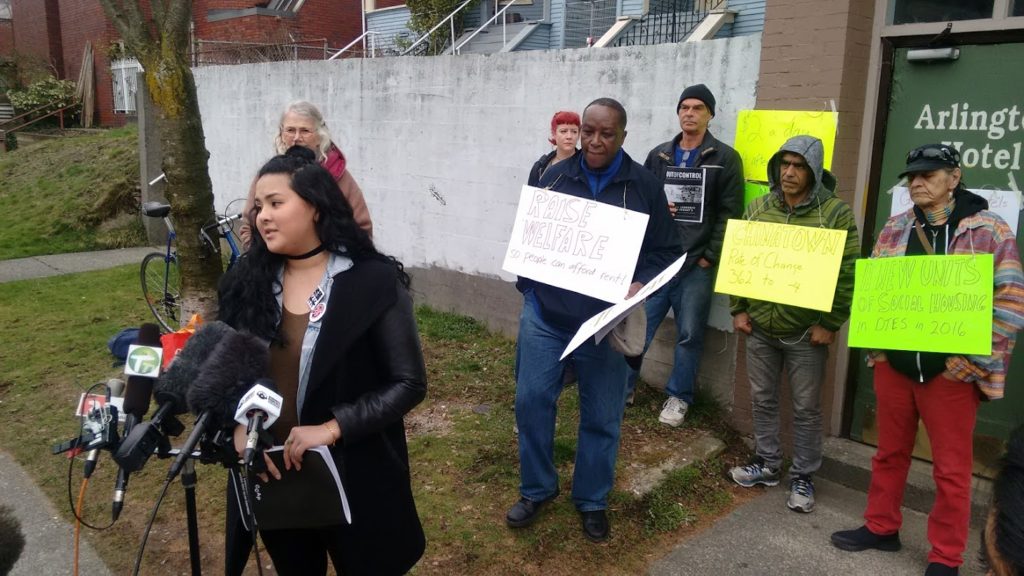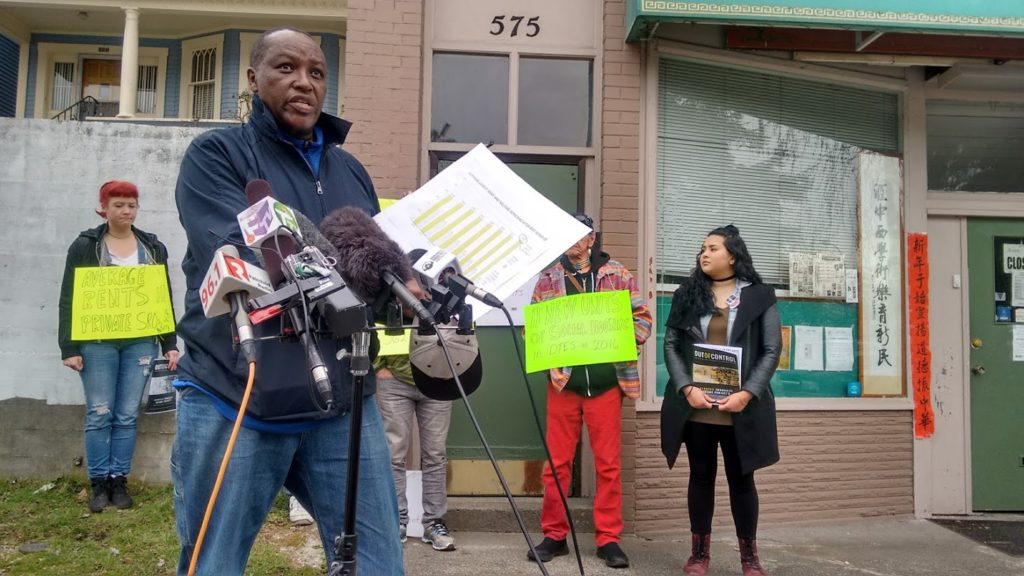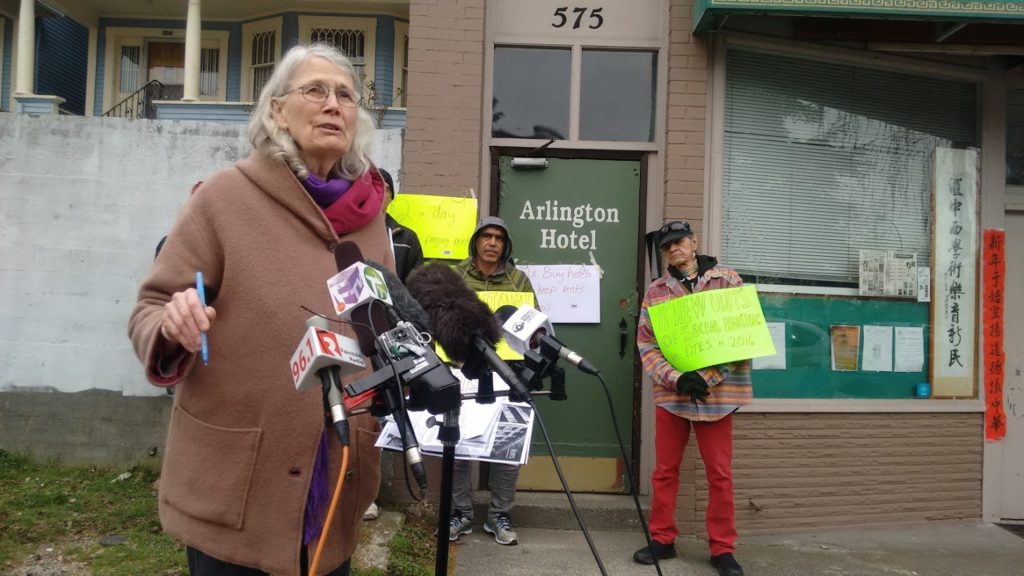
Out of Control: SRO hotel survey finds that market real estate development and low-welfare rates are to blame for record homelessness in the Downtown Eastside

Homelessness in the DTES is a humanitarian crisis. For the first time in recorded history, the number of homeless people in the community escalated to over 1000 in 2016. This means 1 person out of every 18 in the Downtown Eastside is homeless. A major reason for this crisis is the ongoing loss of SRO hotel rooms from the stock of rentals available to people on welfare disability, and pension. Not coincidentally, alongside homeless number, rents in privately owned SRO hotels are also at a record high.
Alongside increasing rents resulting from gentrification, the Carnegie Community Action Project also blames BC’s stagnant welfare rates for homelessness. At the press conference, CCAP organizer Lama Mugabo explained, “Welfare rates have remained stagnant for the past 10 years, despite the galloping cost of living.” Mugabo added, “It’s highly critical that the provincial government raises the welfare rates to at least $1,500 a month to allow people on social assistance to be able to meet the cost of living. The average rent in the DTES is $548 a month and this leaves only 62 to spend on transportation, food and other needs. It’s inhuman.”
Results from CCAP’s annual survey of hotel rents
On Monday, March 20, the Carnegie Community Action Project (CCAP) released its 8th Annual Housing and Hotel Report: Out of Control: Rents and Rate of Change and in the Downtown Eastside. The press conference was held the Arlington Hotel on E. Pender, an SRO hotel recently placed on the market for sale. CCAP wants the city to buy the Arlington to preserve the 30 rooms.
CCAP’s Hotel Report is conducted each year to monitor rent and gentrification in the DTES. In 2016, CCAP surveyed 84 privately owned and operated single SRO hotels. Rent information was gathered from 68 of these hotels with 3,170 rooms or 95% of the rooms in all the privately owned and operated hotels.
The 2016 report found that the average lowest rent has increased to $548, leaving people on welfare with $62 or approximately $2 a day for necessities after rent is paid. CCAP also found 10 SRO hotels with rents above $1,000, with one hotel, the Georgia Manor, renting rooms for $1,600 / month.

Escalating Rate of Change
A major theme of the SRO hotel report is gentrification – the loss of low-income housing as hotels are minorly renovated and rented to relatively higher income renters, and the out of control growth of market real estate development in the Downtown Eastside. The report says:
Since the Local Area Plan was approved in 2014, the gentrification of the low-income neighbourhood has intensified. In 2016, 510 new condominium and market rental housing units were opened in the Downtown Eastside. The new market housing has been accompanied by a growing number of gentrifying retail spaces, which cater to new high-income residents while excluding low-income residents. And in SRO hotels, low-income people have been pushed out by students and workers who are able to pay up to $1000 to live in an SRO room. Some investors, like Steven Lippman, have capitalized on this disaster to make profit off the displacement of Vancouver’s poorest citizens.
Rate of change, the ratio of market to non-market housing in the Downtown Eastside, used to be an important concept for the City of Vancouver. In 2005, the DTES Housing Plan said, “The development of new market housing and low-income housing must proceed together for the Downtown Eastside to remain sustainable.” That is, City policy was that for each unit of market housing, one unit of social housing should be built.
Back in 2005 planners wanted a rate of change of 1:1 because they realized that if market housing was built at a faster rate than social housing, the neighbourhood would become gentrified and low income residents would be displaced. The DTES Local Area Plan which was passed in 2014, abandoned the 1 for 1 rate of change principle in favour of market real estate development.
As a result of this change in policy, the gap between market real estate development to social housing housing construction has exponentially widened. In 2016 CCAP found that 510 new unaffordable units opened while only 11 units at welfare rate opened in the DTES. In Chinatown, the rate of change was even worse with a whopping and inexcusable 362 unaffordable units to an actual loss of 4 SRO units.
“The rate of change shows that more and more rich people are moving into the neighborhood and that there is almost no new housing for low-income people,” said CCAP organizer Maria Wallstam. “If the rate of change continues at the same pace the low-income community in the Downtown Eastside will be displaced and destroyed.”

A call to action to end homelessness
“In the 40 years I’ve been working in the DTES, homelessness has never been so bad,” said Jean Swanson, CCAP volunteer. “The two facts that you need to know about homelessness are that homelessness causes people to have half the life expectancy as other people and ending homelessness is cheaper than maintaining it. Yet, governments continue to churn it out with their policies.”
CCAP recommends all levels of government take immediate action to prevent homelessness from continuing to escalate in Vancouver. A few recommendations include for the Federal and Provincial Government to build 10,00 units a year of low income affordable social housing throughout BC, and for the Municipal Government to buy or lease SRO hotels to prevent them from gentrifying and pushing out low-income residents.
For more recommendations and details, read the report here. http://www.carnegieaction.org/2016-hotel-report/
